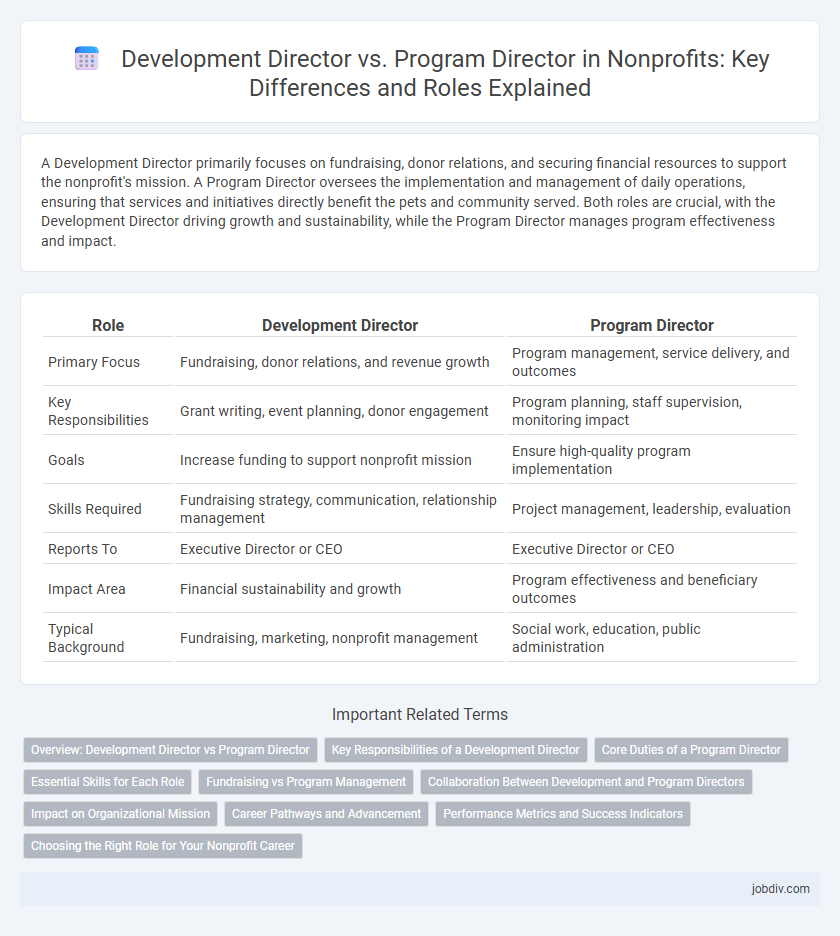A Development Director primarily focuses on fundraising, donor relations, and securing financial resources to support the nonprofit's mission. A Program Director oversees the implementation and management of daily operations, ensuring that services and initiatives directly benefit the pets and community served. Both roles are crucial, with the Development Director driving growth and sustainability, while the Program Director manages program effectiveness and impact.
Table of Comparison
| Role | Development Director | Program Director |
|---|---|---|
| Primary Focus | Fundraising, donor relations, and revenue growth | Program management, service delivery, and outcomes |
| Key Responsibilities | Grant writing, event planning, donor engagement | Program planning, staff supervision, monitoring impact |
| Goals | Increase funding to support nonprofit mission | Ensure high-quality program implementation |
| Skills Required | Fundraising strategy, communication, relationship management | Project management, leadership, evaluation |
| Reports To | Executive Director or CEO | Executive Director or CEO |
| Impact Area | Financial sustainability and growth | Program effectiveness and beneficiary outcomes |
| Typical Background | Fundraising, marketing, nonprofit management | Social work, education, public administration |
Overview: Development Director vs Program Director
The Development Director in a nonprofit focuses on fundraising strategies, donor relations, and securing financial support to sustain organizational growth. The Program Director oversees the planning, implementation, and evaluation of programs that align with the nonprofit's mission, ensuring impactful service delivery. Both roles are critical, with the Development Director driving financial resources and the Program Director managing programmatic outcomes.
Key Responsibilities of a Development Director
A Development Director in a nonprofit organization primarily oversees fundraising strategies, donor relations, and grant writing to secure financial resources. This role involves cultivating partnerships with major donors, managing fundraising campaigns, and coordinating fundraising events to increase revenue. Unlike a Program Director, who focuses on program implementation and outcomes, the Development Director drives organizational growth through strategic financial support.
Core Duties of a Program Director
The Program Director in a nonprofit organization is primarily responsible for overseeing the planning, implementation, and evaluation of specific programs that align with the organization's mission. Core duties include managing program staff, ensuring compliance with grant requirements, monitoring program budgets, and measuring outcomes to demonstrate impact and effectiveness. This role requires strong leadership to drive program success, foster community partnerships, and ensure that services meet the needs of target populations.
Essential Skills for Each Role
Development Directors excel in fundraising strategy, donor relationship management, and grant writing, crucial for securing financial resources to sustain nonprofit operations. Program Directors specialize in program design, team leadership, and outcome evaluation, ensuring effective service delivery and mission alignment. Both roles require strong communication and organizational skills but differ in focus: Development Directors prioritize external partnerships and revenue growth, while Program Directors concentrate on internal program quality and impact measurement.
Fundraising vs Program Management
Development Directors focus primarily on fundraising strategies, donor relations, and securing financial resources to support the nonprofit's mission. Program Directors oversee program management, ensuring that initiatives align with organizational goals and deliver measurable outcomes. Both roles are critical, with the Development Director driving revenue growth while the Program Director ensures effective implementation and impact of services.
Collaboration Between Development and Program Directors
Development Directors and Program Directors collaborate closely to align fundraising strategies with programmatic goals, ensuring resource allocation maximizes impact. Their partnership enhances grant proposals and donor communications by integrating program outcomes with funding needs. Effective collaboration drives organizational growth and strengthens community engagement through cohesive mission-focused efforts.
Impact on Organizational Mission
The Development Director drives fundraising strategies that secure essential resources, directly impacting the nonprofit's ability to fulfill its mission. The Program Director oversees program implementation, ensuring services align with strategic goals and create measurable community outcomes. Both roles synergistically advance organizational impact, with Development fostering sustainability and Program ensuring mission-driven execution.
Career Pathways and Advancement
Development Directors typically focus on fundraising strategies, donor relations, and resource development, positioning themselves for advancement into executive leadership roles such as Chief Development Officer or Executive Director. Program Directors manage the implementation and evaluation of programs, often advancing to senior program management or COO roles that emphasize operational oversight and strategic impact. Both career pathways offer distinct advancement opportunities, with Development Directors excelling in external stakeholder engagement and revenue generation, while Program Directors emphasize programmatic expertise and organizational effectiveness.
Performance Metrics and Success Indicators
Development Directors drive nonprofit fundraising success by tracking donor acquisition rates, campaign ROI, and engagement growth, directly influencing revenue generation. Program Directors measure impact through metrics like service delivery effectiveness, beneficiary outcomes, and program completion rates, reflecting mission fulfillment. Both roles rely on data-driven performance indicators to optimize organizational impact and resource allocation.
Choosing the Right Role for Your Nonprofit Career
A Development Director drives fundraising strategies, cultivates donor relationships, and secures financial resources essential for nonprofit sustainability. A Program Director oversees the design, implementation, and evaluation of nonprofit programs to ensure mission alignment and impact effectiveness. Choosing between these roles depends on your strengths in either resource development or program management, as both are critical for advancing a nonprofit's goals.
Development Director vs Program Director Infographic

 jobdiv.com
jobdiv.com